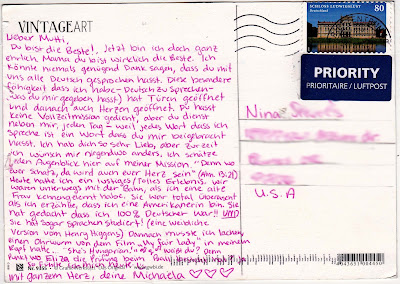
For the past month, I have been homeschooling my three youngest children part-time. So what does that mean? Well, ever since last summer, I have been playing with the idea of pulling my children out of school in order to homeschool them. It's been a struggle for me to figure out what the best option is for my my kids and our non-native bilingual family. I wrote about my quandary in the following posts:
Homeschooling Thoughts? Me? and
More Homeschooling Thoughts: Splitting It Up.
I initially planned on sending them to public school the first half of this school year and then pulling them out after Christmas break and homeschooling them the rest of the year. However, as the school year progressed, I realized that all three of the kids were really thriving in their respective classrooms. They absolutely LOVED going to school and looked forward to it each day. Their teachers were phenomenal and their classrooms had positive, happy, calm, learning-centered atmospheres. I also realized, after receiving their ESL test results
(My American Kids in ESL), that they really needed all the extra English instruction that they could get, both in their ESL class, their regular classroom and on the playground. I suddenly found myself having second thoughts about pulling them out of school.
But, on the other hand, I still wanted them to progress in their German literacy. I wanted them to learn to read and write in German and to really solidify their fluency in the German language. I wanted extra time at home to just read and read and read (both German and English)
(The Read-Aloud Handbook). I also wanted to start learning French with them
(Introducing French). And most of all, I wanted extra time with my little ones because I know from experience just how fast kids grow up!
So, what to do? Well, in November, I approached our amazing elementary school principal with my predicament. She knew of my initial choice to pull the kids out after Christmas. I explained my dilemma and asked about the possibility of doing school part-time instead of completely withdrawing. It turns out that my Kindergartners already only go to school 3 days a week. So it was only a matter of figuring out if we could have my first-grader stay home the same days that my Kindergartners are at home. We found the first grade teacher to be completely supportive and understanding of our situation. I was thrilled with our wonderful compromise. It seemed to combine the best of both worlds and promised to meet all the educational objectives that we have for our unique bilingual kids. Starting in January, we decided that we would homeschool on Tuesdays and Fridays and have the kids go to public school on the other three days. I was blown away by the cooperation and support that I felt from our wonderful elementary school. We have a great school district!

We're now in our 3rd week of this amazing part-time homeschooling experiment and, so far, we are absolutely loving it. I initially thought that we would get all of our homeschooling done before noon, but, it turns out we have so much to do, that we end up working hard into the afternoon.
Here's a very rough schedule of our typical "deutsche Schule" (German School) day:
- 6:30 Family Scripture Reading and Morning Jobs (dressed, teeth, room)
- 7:00 Breakfast and Kitchen Jobs (chores)
- 8:00 Quiet Reading in Family Room, also read together from Fibel (Primer or Textbook)
- 8:30 Snack Break
- 9:00 Go to Schoolroom (attic)
- Calendar Time
- Writing worksheets (letters, sounds, spelling, cursive, etc)
- Word games
- Crafts
- Math Sheets
- 11:30 Lunch and Recess (Outside, of course!)
- 1:00 French Class in Family Room
- 2:00 Read books, Color, Do more crafts, play educational computer games, or something fun.
- 3:00 Play hard until dinner (love to watch them at play)

I took the following video of the kids up in our schoolroom (attic) last week as they were working on the worksheets which go along with the sound "ch". The kids are all at slightly different levels and some are more wiggly than others, but it's so fun to spend this special time with them. I'm super excited to have this opportunity to help them to supplement their public schooling with our non-native language schooling!



























